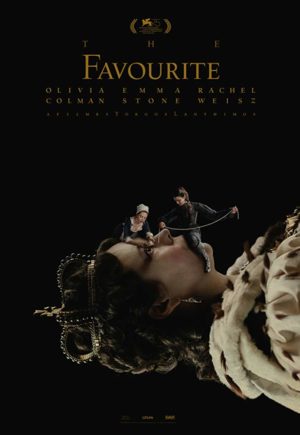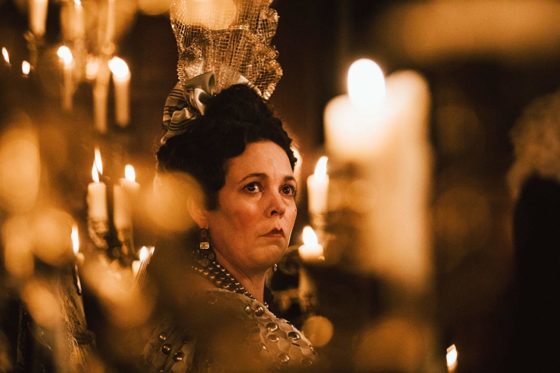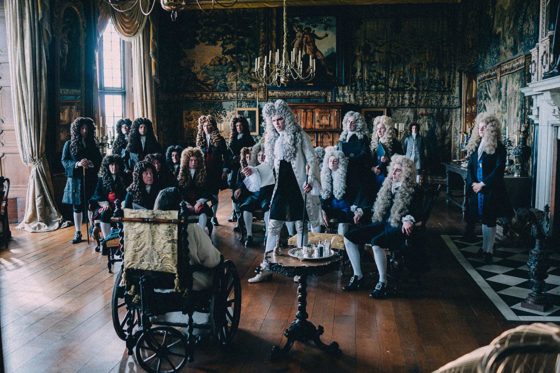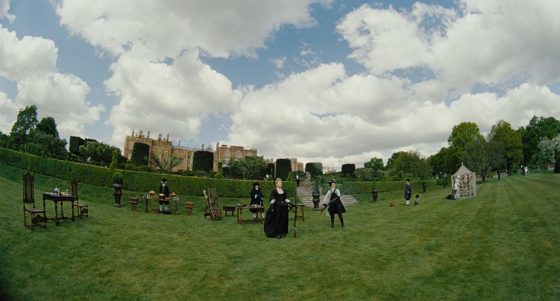
 [Rating: Minor Rock Fist Up]
[Rating: Minor Rock Fist Up]
The Favourite is about duality and paradoxical natures – from the characters to the movie itself. It’s both a lark and an endurance test. It’s witty and acerbic, but tragic and confined.
A quick history lesson: Anne (Olivia Colman) was Queen of Great Britain for five years in the early 1700s, and was rumored to have a romantic relationship with her childhood friend Sarah Churchill (Rachel Weisz), Duchess of Marlborough and woman ahead of her time, as well as Sarah’s poor relation Abigail Hill (Emma Stone).
The Favourite finds the tension in that history and embellishes. At the start of the film, the bond between Anne and Sarah is beginning to fray due to Sarah’s overbearing nature and the Queen’s insecurity. When Sarah’s cousin Abigail arrives at the castle looking for work, Sarah takes the opportunity to get some space from the clingy Queen. Abigail just takes the opportunity, and before Sarah realizes the game, her competitor has a substantial lead in the game to take the Queen.
Weisz fills Sarah with confidence and power – she’s a woman whose brain has granted her stature above her status. She is comfortable at the top, and therefore vulnerable. But she also presents her without a shred of vulnerability – Sarah is commanding and self-assured. Weisz generates energy with everyone she’s onscreen with. Her scenes with her opposition in Parliament, Robert Harley (About A Boy co-star Nicholas Hoult has grown up considerably since they last shared a screen), crackle with antagonism. Her scenes with Colman are like watching a tightrope walker trying to re-find her balance.
Stone takes an opposing stance as the warm and ambitious Abigail. Though Abigail lacks the privileges Sarah has, she knows how to work a room and she ruthlessly uses everything at her disposal, without venturing into simpering and pathetic. She’s more dark horse than underdog.

But Queen Anne is the unstable star these players orbit, and Colman perfectly foils them all. She’s as vulnerable as Sarah is strong and as pathetic as Abigail is enterprising. She’s as needy as a child and practically dissolves into the space around her. Sarah’s abrasive tones and firm, unyielding honesty are the seams holding Queen Anne together. Colman’s masterful physical performance appears effortless in its discomfort and adds to the tragedy of an already tragic character (all 17 of her children died – that’s history – and in the film, she’s replaced them with pet rabbits. It’s absurd and uncomfortable).
As the players take their places, everyone has an agenda. The Whigs, led by Sarah, battle the Tories, led by Robert Harley, for the Queen’s ear. Sarah has an advantage thanks to her close, very personal relationship with the Queen. When Abigail learns the true nature of the two women, she makes a more cunning move than merely tattling.
On one level, The Favourite is fun just for the gender-swapped power dynamics. While the ladies are shooting guns and masterfully engaging in politics, the boys are powdering their noses and competing to bed the latest young thing. Watching these three actresses spar, manipulate, and demur from the top of their game is really entertaining. And, their dresses have deep, cavernous folds at the waist – aka pockets – which prove useful at court, and genuinely made me laugh.

The occasional fish-eye lens adds to the strange atmosphere and brings a modern feel to the film without adding anachronism: this era is not-so-innocent. It also turns the characters into something like goldfish in bowls. The sets, though beautiful, are limited to a few rooms within the castle, and it underscores how limited the influence of these women really is.
Unfortunately, the pacing and script are very uneven. For every sardonic quip there are five minutes of extra film that could’ve been cut. The film is presented in needless chapters that disjoint rather than create a passing of time. The music – mostly strings, and often perfectly atmospheric – devolves into a single, gratingly repetitive note too many times. It reminded me of that dubstep tone in every Transformers trailer – but with a cello.

Director Yorgos Lanthimos makes a subtle point that love is not necessarily pretty and fun and self-sacrificing. It’s better when it’s honest with a healthy dose of self-respect. But it’s too little, too late. By then, it’s all too bleak.
There’s no recourse when it all falls apart, there’s no higher thing to attain to. When Abigail is not nearly as ambitious and Sarah not nearly as strong, the whole thing wreaks of nihilism that leads to numbness. By the last scene, I just felt sorry for everyone involved. There are no winners here, and ultimately Queen Anne, Sarah and Abigail are not as powerful as they appeared – mostly due to their own bad choices.




Comments on this entry are closed.